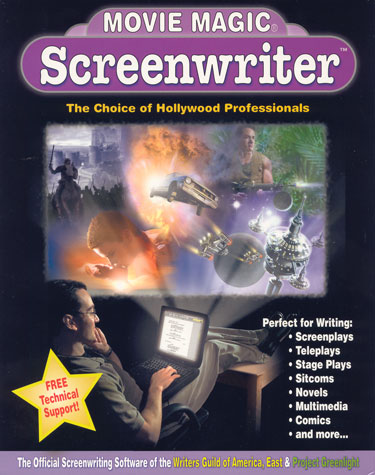

Movie Magic Screenwriter Review

New Review - Movie Magic Screenwriter
What is it and what does it do?: Movie Magic Screenwriter
is a stand-alone software program that works with both Windows and
Macintosh/Apple computers. It is screenplay formatting software
that automaticlly handles current Hollywood standard formatting, auto
character names, and outlining in an easy to use interface that mostly
uses the "TAB and ENTER" keys.
Movie Magic Screenwriter is a powerful screenplay formatting software program that is packed
with advanced features but is simple enough for any novice to
use. The advanced features are there when you need them, but
won't get in the way of basic scriptwriting.
Movie Magic Screenwriter's Top Features:
* Automatic industry standard script formatting using a simple TAB-ENTER system
* Real-time internet collaboration with a writing partner including script compare to highlight version differences
* Online script registration
* Index cards, script notes, simple entry of character names, and smart margin changing.
* Export to Adobe Acrobat PDF format
* Production features and script analysis features
* Script breakdown feature
* Detailed export to Movie Magic Scheduling
* Spell checking (including a real-time auto-correction) and a built-in thesaurus
* Digital voice readback of your script
* 8 different script formats including animation, TV, and multimedia
* Full set of reports to generate set lists and rundowns, and number of scenes each character is in, etc.
* Plus free phone, internet and email technical support
StoryPros "Real World Analysis" of Movie Magic Screenwriter:
So, with four or five other screenplay formatting programs out there plus a few Microsoft Word "add-on" macro formatting aids, why would you choose Movie Magic? Ease of use and simplicity.
Writing a script with Movie Magic is effortless. Just set up your basic parameters: script format, title, etc. and start writing. Typing Fade In" automatically converts it to all capital letters (scene heading slugs are automatically done in this manner as well). Hit ENTER and the program instantly knows you are ready to begin writing a scene heading slug. Hit ENTER again and the program knows you are writing scene/action description. When you are ready to write dialogue, hit the TAB key and type a character name. The first time you enter in a new name, the program remembers it, and adds it to the list of characters in the script. When you go to write another line for this character, just typing the first letter of the character name will bring up or auto-fill in the character name for you. Just hit ENTER and the name is automatically typed in and the program drops the cursor down to the dialogue area. (Note: You'll probably find that you'll start naming every one of your characters with names that begin with different first letters to ease character entry in this manner).
Isn't that what you really want from your formatting program? All of the formatting programs promise that their software works in this manner to deliver a simple system to help you write in correct screenplay format that doesn't slow up your workflow. Well, this program delivers on that promise.
Movie Magic is chock full of bells and whistles, some that you may never find a use for. The "script readback" feature is a nice idea, sort of an electronic "table read" of your screenplay to let you hear the dialogue spoken to give you an idea whether the dialogue rings true and sounds natural or not. However, the program's electronic voice sounds a bit too much like the Star Trek computer voice to be considered "natural" speech.
The most useful features are the spelling auto-correction, index cards, scene notes, script compare, the built-in thesaurus, and the "cheat" function.
We at StoryPros read and anaylze lots of scripts. Typos are the one thing that we find more than any other script flaw. They are universal. A typo isn't always a misspelling but often is an unintentional mis-keying of a word that you would normally spell correctly. If you turn on the spelling auto-correction and leave it active, you will eliminate 90% of your typos the first time. The program can't correct grammer errors (not yet at least) but eliminating basic typos is worth its weight in gold.
Using the index card feature is a nice way to get a quick visual of your movie's scene structure and you can easily move/reorder scenes using the cards. You can also print them for a more traditional method of using scene cards. The scene notes act like yellow post it notes that you can drop onto the pages reminding you to work on correcting this scene later, etc.
The script compare feature is useful whether you are working with a writing partner or for comparing two of your own drafts. The program will take two version of the scipt compare the two and create a new single version that combines both scripts and highlights the revisions and additions between the two or to highlight the changes made by your writing partner. Along with script compare is the real-time collaboration mode which lets you and your partner work on the same file together over the internet.
Another very useful feature is the built-in thesaurus. Simply highlight the word, hit the F5 key and up pops a list of replacement words and synonyms. My only gripe about the thesaurus is that is is somewhat limited in its database of words. A really good thesaurus or site like Thesaurus.com will yield more results then Movie Magic's results, but it will give you a good number of choices 8 out of 10 times. If it doesn't offer you "just the right word you were looking for," you can then go to other sources.
Lastly, a very nice function built-into Movie Magic is the "Cheat" function. This feature allows you to effortless alter the margins and/or line spacing to "cheat" your page count. Ever find yourself with a 128 page script and you know you have to get it into the 115-120 page count range (if you don't know this than you have bigger problems) but just can't bring yourself to cut out the 3-5 additional scenes that will have to go in order to make the page count? Well, why not just subtly cheat the margin or line spacing and not lose any scenes? You can do it effortlessly in Movie Magic. By page cheating are you breaking industry format? Well...yes, but if you only need to lose a few pages, the changes in margins or line spacing will be unnoticeable.
So, is this program better than all others screenplay programs on the market, well, its as good or better than most. Final Draft is the other main formatting program, and it has its fans as well. I have used both but find myself using Movie Magic for the bulk of my writing. I have used others in the past as well such as Scriptware, which is a very simple to use program as well, but you may find that if you don't go with one of the two "big names" in the formatting game, that support is less available and sending "native" format scripts to contests, etc. will be more troublesome.
Your best bet is to download a demo of the program and try it out for yourself.
Movie Magic Screenwriter's Top Features:
* Automatic industry standard script formatting using a simple TAB-ENTER system
* Real-time internet collaboration with a writing partner including script compare to highlight version differences
* Online script registration
* Index cards, script notes, simple entry of character names, and smart margin changing.
* Export to Adobe Acrobat PDF format
* Production features and script analysis features
* Script breakdown feature
* Detailed export to Movie Magic Scheduling
* Spell checking (including a real-time auto-correction) and a built-in thesaurus
* Digital voice readback of your script
* 8 different script formats including animation, TV, and multimedia
* Full set of reports to generate set lists and rundowns, and number of scenes each character is in, etc.
* Plus free phone, internet and email technical support
StoryPros "Real World Analysis" of Movie Magic Screenwriter:
So, with four or five other screenplay formatting programs out there plus a few Microsoft Word "add-on" macro formatting aids, why would you choose Movie Magic? Ease of use and simplicity.
Writing a script with Movie Magic is effortless. Just set up your basic parameters: script format, title, etc. and start writing. Typing Fade In" automatically converts it to all capital letters (scene heading slugs are automatically done in this manner as well). Hit ENTER and the program instantly knows you are ready to begin writing a scene heading slug. Hit ENTER again and the program knows you are writing scene/action description. When you are ready to write dialogue, hit the TAB key and type a character name. The first time you enter in a new name, the program remembers it, and adds it to the list of characters in the script. When you go to write another line for this character, just typing the first letter of the character name will bring up or auto-fill in the character name for you. Just hit ENTER and the name is automatically typed in and the program drops the cursor down to the dialogue area. (Note: You'll probably find that you'll start naming every one of your characters with names that begin with different first letters to ease character entry in this manner).
Isn't that what you really want from your formatting program? All of the formatting programs promise that their software works in this manner to deliver a simple system to help you write in correct screenplay format that doesn't slow up your workflow. Well, this program delivers on that promise.
Movie Magic is chock full of bells and whistles, some that you may never find a use for. The "script readback" feature is a nice idea, sort of an electronic "table read" of your screenplay to let you hear the dialogue spoken to give you an idea whether the dialogue rings true and sounds natural or not. However, the program's electronic voice sounds a bit too much like the Star Trek computer voice to be considered "natural" speech.
The most useful features are the spelling auto-correction, index cards, scene notes, script compare, the built-in thesaurus, and the "cheat" function.
We at StoryPros read and anaylze lots of scripts. Typos are the one thing that we find more than any other script flaw. They are universal. A typo isn't always a misspelling but often is an unintentional mis-keying of a word that you would normally spell correctly. If you turn on the spelling auto-correction and leave it active, you will eliminate 90% of your typos the first time. The program can't correct grammer errors (not yet at least) but eliminating basic typos is worth its weight in gold.
Using the index card feature is a nice way to get a quick visual of your movie's scene structure and you can easily move/reorder scenes using the cards. You can also print them for a more traditional method of using scene cards. The scene notes act like yellow post it notes that you can drop onto the pages reminding you to work on correcting this scene later, etc.
The script compare feature is useful whether you are working with a writing partner or for comparing two of your own drafts. The program will take two version of the scipt compare the two and create a new single version that combines both scripts and highlights the revisions and additions between the two or to highlight the changes made by your writing partner. Along with script compare is the real-time collaboration mode which lets you and your partner work on the same file together over the internet.
Another very useful feature is the built-in thesaurus. Simply highlight the word, hit the F5 key and up pops a list of replacement words and synonyms. My only gripe about the thesaurus is that is is somewhat limited in its database of words. A really good thesaurus or site like Thesaurus.com will yield more results then Movie Magic's results, but it will give you a good number of choices 8 out of 10 times. If it doesn't offer you "just the right word you were looking for," you can then go to other sources.
Lastly, a very nice function built-into Movie Magic is the "Cheat" function. This feature allows you to effortless alter the margins and/or line spacing to "cheat" your page count. Ever find yourself with a 128 page script and you know you have to get it into the 115-120 page count range (if you don't know this than you have bigger problems) but just can't bring yourself to cut out the 3-5 additional scenes that will have to go in order to make the page count? Well, why not just subtly cheat the margin or line spacing and not lose any scenes? You can do it effortlessly in Movie Magic. By page cheating are you breaking industry format? Well...yes, but if you only need to lose a few pages, the changes in margins or line spacing will be unnoticeable.
So, is this program better than all others screenplay programs on the market, well, its as good or better than most. Final Draft is the other main formatting program, and it has its fans as well. I have used both but find myself using Movie Magic for the bulk of my writing. I have used others in the past as well such as Scriptware, which is a very simple to use program as well, but you may find that if you don't go with one of the two "big names" in the formatting game, that support is less available and sending "native" format scripts to contests, etc. will be more troublesome.
Your best bet is to download a demo of the program and try it out for yourself.
BUY IT NOW
BUY IT NOW


Enter your email address in the box above and GO!
StoryPros E-Zine
Get the latest news, articles, events, and exclusive discounts on our
services and contests!